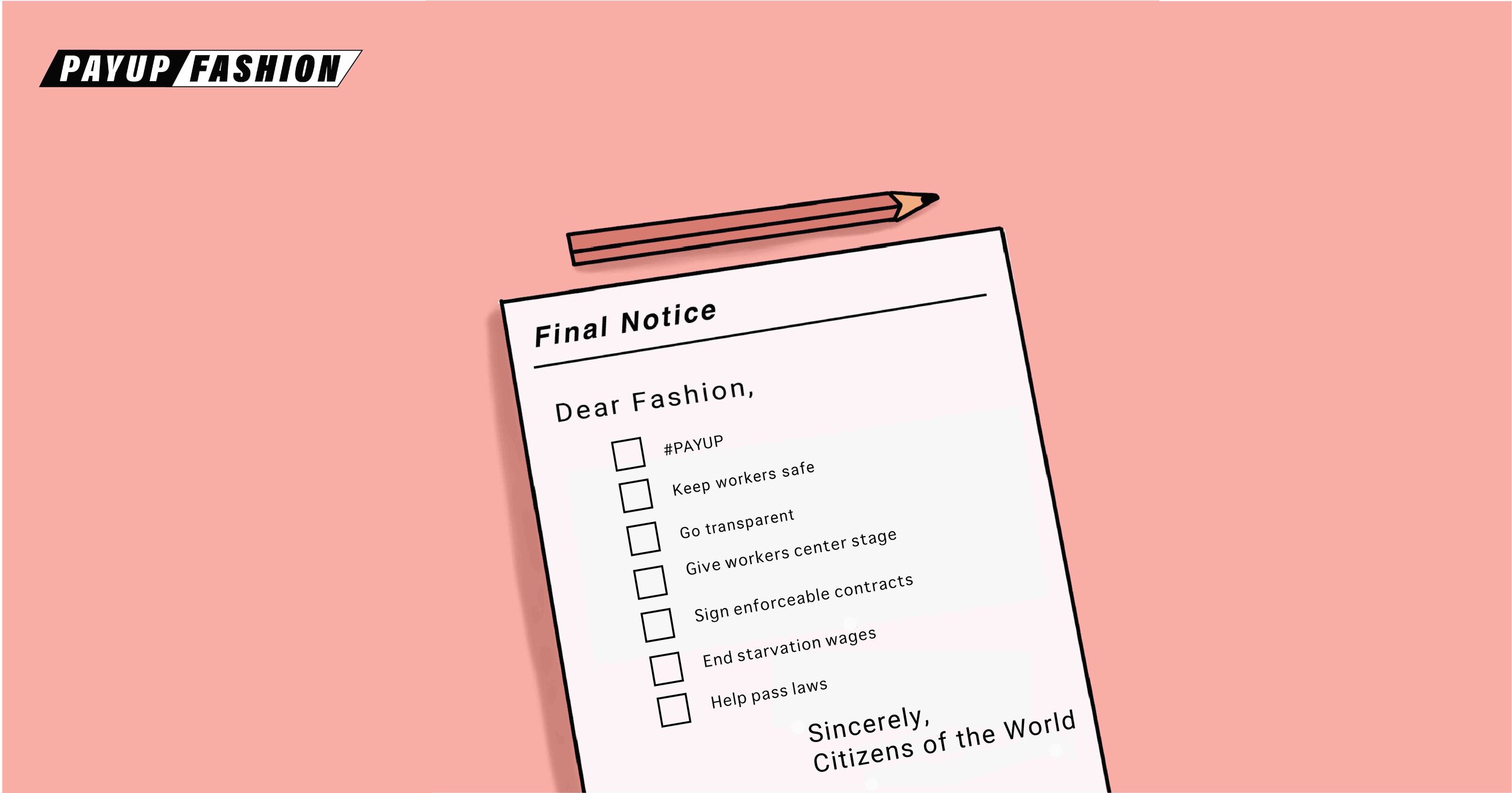Pay Up Fashion
Formed out of the fashion industry’s catastrophic decision to refuse payment for completed orders heading into the COVID-19 pandemic, the #PayUp Movement is one of the most successful labor rights campaigns in the history of the fashion industry. Strengthened by the power of social media, the movement - a global coalition of garment workers, labor organizations and citizen advocates - went viral, garnering the support of over 272k citizens and unlocking an estimated $1 billion for suppliers in Bangladesh and $22 billion globally.
But work is not done. Many brands and retailers still refuse to #PayUp, and fashion’s most essential workers remain on the brink of starvation and homelessness. Post COVID-19, going back to business as usual is not an option. Building on the movement’s success and the clear-cut need for major industry reforms, #PayUp is taking its campaign to the next level and launching a long-term vision for change called PayUp Fashion, which lays out concrete, actionable labor rights goals.
The aim is to centre worker voices and demands in the future of fashion. The campaign kicks off with the launch of a new website PayUpFashion.com, where the public is encouraged to show its support by signing the petition and sharing their support on social media. PayUp Fashion is pressuring 40 major brands and retailers including Nike, Gap, Walmart, and Urban Group to transparently report on the following 7 actions annually: to #PayUp, keep workers safe, go transparent, give workers centre stage, sign enforceable contracts', end starvation wages, help pass laws.
In the coming weeks and months, PayUp Fashion will track brands’ progress towards being truly ethical and sustainable, releasing mini campaigns via social media to leverage citizen power, keeping garment worker voices in the conversation.
Developed over several months with extensive input from garment worker and union leaders, frontline labor rights groups, academics, and legal experts, PayUp Fashion was co-authored by Ashila Niroshi, the Founder of Stand Up Lanka, a Sri Lankan garment worker advocacy NGO, Nazma Akter, Founder and Executive Director of AWAJ Foundation, the Bangladeshi labor rights NGO that represents 600,000 garment workers as well as #PayUp organizers Ayesha Barenblat, the founder of USA-based advocacy group Remake; and Elizabeth L. Cline, a journalist and author.
Unlike most brand-led campaigns to reform fashion, #PayUp is a data and research-driven movement that amplifies the extensive knowledge and on-the-ground experience of garment workers, factory owners, and their allies. The campaign keeps in constant contact with its sources around the world, amplifying worker demands. “With PayUp Fashion, the #PayUp movement is putting forth a worker-centric vision for the future of fashion. Real systemic change is only possible when workers and citizens get together, which is why we will no longer allow brands and retailers to control the conversation or shape the agenda for labor rights,” says Cline.
"The #PayUp campaign has been incredibly important for workers in Bangladesh, particularly female workers,” says Akter. “When companies have not paid their bills and workers have lost income, it has affected all aspects of workers lives. Many brands are most focused on profit and how to cut costs and therefore prioritise consumers and their products over women workers and how they are disproportionately affected by the injustices in their supply chain,” says Akter. “While they provide charity efforts, they shirk their responsibilities to ensure basic rights for workers. Alongside the dire need for living wages, we want justice, freedom of association, an end to gender based violence and equal pay for equal work."
http://payupfashion.com
